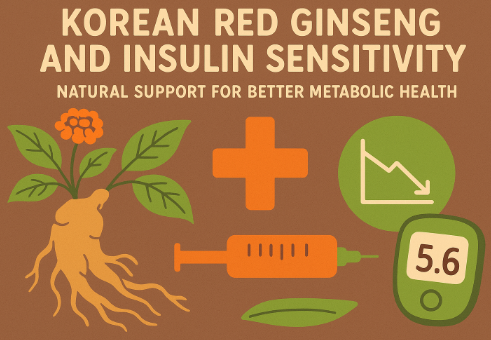Insulin sensitivity plays a crucial role in how efficiently your body uses glucose for energy. When the body becomes less responsive to insulin—a condition known as insulin resistance—blood sugar levels rise, increasing the risk of metabolic syndrome and type 2 diabetes. While lifestyle choices like diet and exercise are foundational for maintaining insulin balance, scientific research shows that Korean Red Ginseng (Panax ginseng C.A. Meyer) may offer powerful, natural support for improving insulin sensitivity and overall metabolic function.
1. Understanding Insulin Sensitivity
Insulin is a hormone produced by the pancreas that helps cells absorb glucose from the bloodstream. When your cells respond well to insulin, glucose is efficiently converted into energy. However, poor diet, chronic stress, inflammation, and lack of exercise can reduce this sensitivity, forcing the pancreas to produce more insulin. Over time, this imbalance contributes to insulin resistance, fatigue, and weight gain — key markers of metabolic dysfunction.
Korean Red Ginseng helps break this cycle by targeting several biological pathways that regulate glucose uptake and insulin response.
2. The Role of Ginsenosides in Enhancing Insulin Response
The active compounds in Korean Red Ginseng, known as ginsenosides, are responsible for many of its metabolic benefits.
Several studies suggest that ginsenosides such as Rb1, Rg1, and Re can enhance insulin sensitivity by:
- Activating AMPK (Adenosine Monophosphate-Activated Protein Kinase) — an enzyme that increases glucose uptake in muscle and liver cells.
- Improving insulin receptor signaling, allowing cells to respond more effectively to insulin.
- Reducing inflammation in adipose tissue (body fat), which often disrupts insulin pathways.
A 2021 review published in the Journal of Ginseng Research concluded that red ginseng extracts improve insulin sensitivity and glycemic control through these multi-target mechanisms.
👉 Read the full article here
3. Korean Red Ginseng and Metabolic Balance
Korean Red Ginseng doesn’t just act on glucose metabolism—it supports overall metabolic balance.
It has been shown to:
- Lower fasting blood glucose and HbA1c levels.
- Improve lipid metabolism by reducing triglycerides and LDL cholesterol.
- Support mitochondrial energy production, which enhances stamina and reduces fatigue.
By modulating these interconnected systems, ginseng helps restore metabolic harmony, making it an effective natural aid for people with mild insulin resistance or pre-diabetic conditions.
4. Anti-Inflammatory and Antioxidant Benefits
Chronic inflammation and oxidative stress are two of the biggest contributors to insulin resistance. Korean Red Ginseng’s anti-inflammatory and antioxidant properties protect cells from damage caused by free radicals and inflammatory cytokines such as TNF-α and IL-6.
By lowering oxidative stress in the pancreas and muscle tissues, ginseng helps preserve insulin receptor integrity and ensures smoother glucose regulation.
5. Clinical Evidence Supporting Insulin Sensitivity
Several human trials have demonstrated Korean Red Ginseng’s positive impact on insulin sensitivity:
- A double-blind study at Kyung Hee University (2019) found that subjects taking red ginseng for 8 weeks showed a 15% improvement in insulin sensitivity compared to the placebo group.
- Another clinical trial in the Diabetes & Metabolism Journal reported significant reductions in fasting glucose and improved insulin signaling markers among participants consuming Korean Red Ginseng extract.
These findings confirm that Korean Red Ginseng acts as both a metabolic modulator and an insulin sensitizer, complementing lifestyle and dietary interventions.
6. How to Use Korean Red Ginseng for Optimal Results
To support insulin sensitivity naturally:
- Dosage: 1000–2000 mg per day of standardized extract.
- Best form: Capsules, concentrated extract, or tonic made from 6-year-old red ginseng roots (the most potent variety).
- Timing: Morning or before meals for optimal absorption and steady energy levels.
Always consult a healthcare professional if you’re taking insulin or antidiabetic medication, as ginseng may enhance their glucose-lowering effects.
7. Final Thoughts
Korean Red Ginseng represents a bridge between ancient herbal wisdom and modern metabolic science. Its ability to enhance insulin sensitivity, reduce inflammation, and stabilize blood sugar makes it a valuable natural ally for anyone seeking to improve metabolic health.
Combined with a balanced diet, regular physical activity, and stress management, Korean Red Ginseng can help your body use energy more efficiently—promoting vitality, endurance, and long-term wellness.
🇰🇷 Premium Korean Ginseng Online Shop







